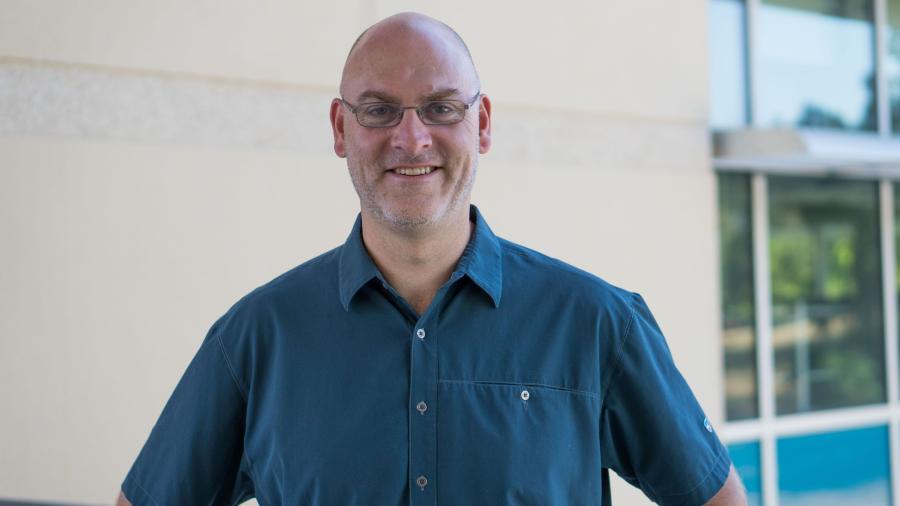Westmont Magazine Open-Source Software Helps Researchers Share Their Work

Brian Granger ’94, a physics professor at Cal Poly San Luis Obispo, has devoted his career to developing Project Jupyter, open-source software widely used to analyze data in research, education, journalism and industry. Companies such as Amazon, Microsoft, Google and IBM have created commercial data science platforms based on this software. Brian, his co-leader, Fernando Pérez of UC Berkeley, and their international Jupyter Steering Council received the 2018 Software System Award from the Association of Computing Machinery, the world’s largest society of educational and academic computer scientists.
“In science, collecting and analyzing data can be an exploratory and playful process,” Brian says. “Seeing what the data tells you leads to further exploration. We wanted to write interactive computer programs we could refine and modify as we went along to support the exploration of subsequent questions. Scientists want to build a narrative they can present to others in reporting on their research, whether in an article for a journal, a talk at a conference, or in class. The Jupyter Notebook enables you to do that. Imagine a Microsoft Word document that includes live computations, data visualizations and mathematical equations.”
When Brian started developing open-source software in 2004, he and his colleagues wanted to build something for their own use in teaching and research. They spent seven years developing the first version of the Jupyter Notebook, designing and throwing away multiple prototypes as they learned the technology required for what they envisioned. By the 2010s, the world outside of academic science started to wake up to the value of data. The growth of data available online and the ongoing resurgence in machine learning prepared industry and academia to quickly adopt Jupyter once it became available.
Pérez, a classmate of Brian’s from graduate school, started a sister project, IPython, in 2001. He and Brian began brainstorming about these systems and became close friends and colleagues who work together on Jupyter to this day. Eventually, more than 500 contributors participated in the project, and dozens of people have built careers on it.
“I’ve always believed that some types of software and applications benefit dramatically by being open-source, especially in science and education,” Brian says. “That allows as many people as possible to use and extend the software. It would be too difficult and expensive to build any other way. We can’t build open, accessible science education on expensive commercial programs.
“All the major computing companies offer software based on Jupyter,” Brian says. “Usage has spread far beyond science and machine learning with a number of media outlets relying on it for their data-driven journalism. A professor at MIT uses it to analyze music, English professors do textual analysis with it, and many students rely on it to learn programing.”
Despite the highly specialized nature of his work, Brian says his success has depended more on his writing skills than his technical ability. “The critical thinking and writing I did at Westmont made a difference,” he says. “I write nonstop, hundreds of pages a year: grant proposals, press releases, emails. Russian history with Shirley Mullen was my boot camp in writing. “
Brian focused on his studies at Westmont. “The small environment was perfect and exactly what I needed,” he says. “I learned the centrality of Christ at Westmont and the importance of relationships. I started figuring out how to live every day by making priorities, and building relationships became a deep underpinning of everything that has happened in my life since college. It was a special time when something deep and deliberate occurred in my life, and it stuck with me.”
An engineering physics major at Westmont, Brian earned a doctorate in theoretical atomic, molecular and optical physics at the University of Colorado at Boulder. He completed a postdoctoral fellowship at Harvard before accepting a faculty position at Santa Clara University in 2003. He appreciates the university, which reminded him of Westmont. But he couldn’t imagine living in the expensive, crowded Bay Area. He left Santa Clara in 2006 and worked for two years at a small tech startup in Boulder, Colorado. He soon realized he preferred working at a university and was delighted to join the physics faculty at Cal Poly San Luis Obispo in 2008.
In 2019, Brian took a leave of absence from Cal Poly to work with Amazon Web Services (AWS) as a principal technical program manager. “I’m one of the leaders in the machine learning services organization,” he says. “At AWS, we’re taking Jupyter and other open-source software and adapting them for large-scale enterprise usage.”
“My Westmont experience was so good because I got to grow intellectually, relationally and spiritually without the grief, loss and pain I’ve experienced as an adult,” Brian says. In 2013, he and his wife, who had two children together, separated and eventually divorced. “The church had not prepared me for divorce,” he says. “This was a very painful time. I had to learn how to invest in my children while seeing them less often.”
Brian and his second wife, Lisa, have five children, ages 14-23, between them.
“I’m deeply grateful that my life is rich and joyful even though it’s not what I thought it would be,” he says. “I was a model student at Westmont and won the Monroe Award, but the path I envisioned in life did not include this much pain and failure. It’s important to point out that you can be wildly successful and have deep faith and still suffer miserably and fail spectacularly.”